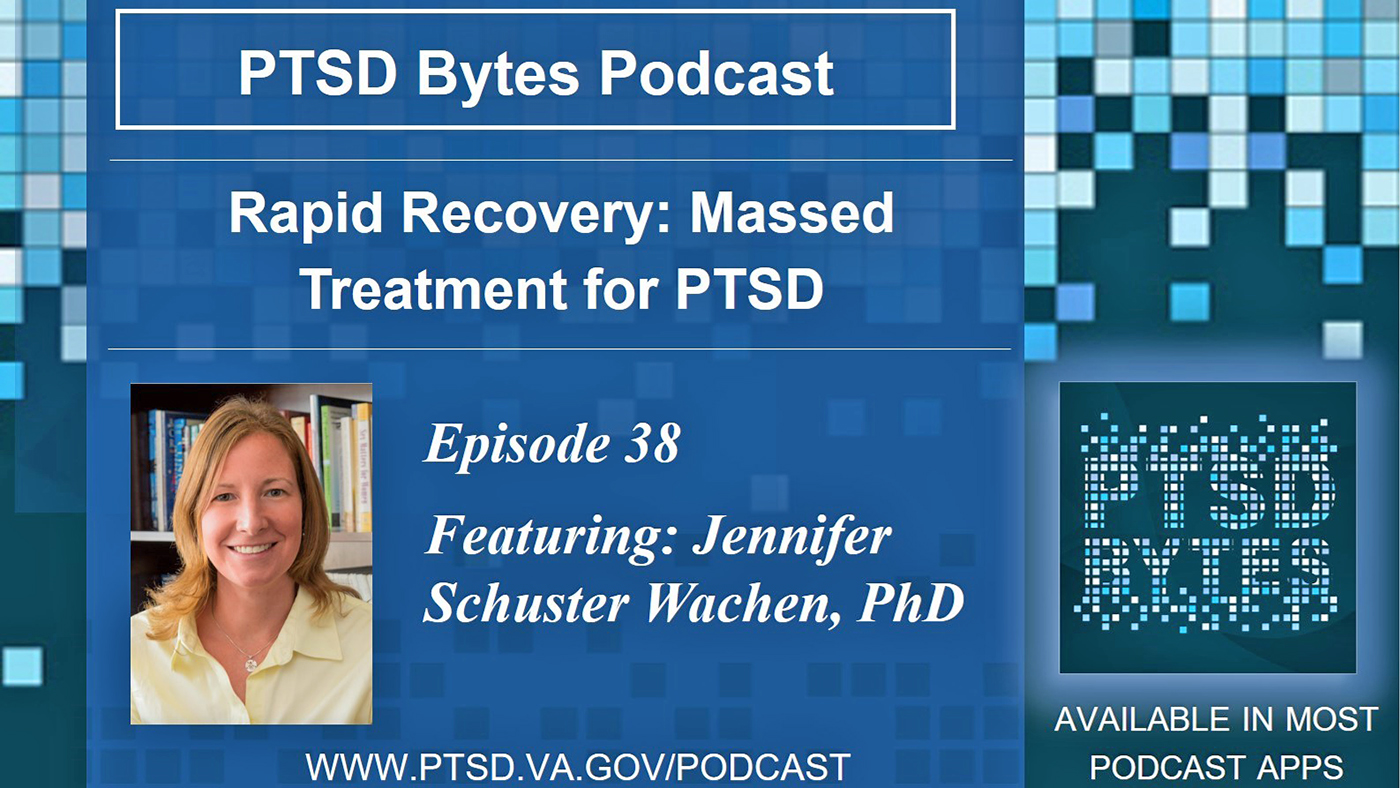In this episode of the PTSD Bytes podcast, host Dr. Colleen Becket-Davenport discusses massed treatments for PTSD with Dr. Jennifer Schuster Wachen, a clinical research psychologist at the Women’s Health Science Division of the National Center for PTSD, a consultant with the VA PTSD Consultation Program, and associate professor in the Department of Psychiatry at the Boston University Chobanian & Avedisian School of Medicine.
Massed treatments for PTSD
“Massed treatment” refers to delivering psychotherapy in a shorter timeframe than usual. For instance, a standard treatment may have you attending therapy sessions once a week for multiple months. Massed treatment might mean that you attend therapy sessions three times a week (or more), so the course of therapy is completed much more quickly.
In other words, the treatment itself is condensed or “massed” together. You can still participate in therapy in one-on-one sessions with your therapist. Massed treatments can also be done in small groups as well.
Research has shown that massed treatments can be as effective as treatment delivered in the standard way. However, we don’t yet know which types of people, conditions or situations would be best suited for massed treatments. Some people may like the idea of completing therapy in such a short amount of time but others might find that less appealing—for various reasons.
Logistical factors can also play a role in deciding if frequent sessions are more doable. Talk with your provider about your preferences and choose what sounds best to you.
Structure of massed treatments
A provider can deliver massed treatments three or more times per week via regular clinic visits or telehealth. In addition, existing programs designed for service members and Veterans include more comprehensive options.
Two- to three-week intensive outpatient programs
- Consists of intensive outpatient programs with daily treatment sessions.
- Each day includes one or more session of trauma-focused therapy (groups or individual).
- Other activities may include groups to address topics such as stress management or sleep problems, yoga, other physical activities and nutrition counseling.
Trauma-focused therapy programs
- Include just the trauma-focused therapy delivered more frequently without extra programming.
- Offer evidence-based treatment for PTSD delivered three to five days per week.
- May also include check-in groups that provide support a few times throughout the day with time allotted to complete therapy take-home assignments.
Benefits and drawbacks of massed treatment programs
Potential benefits
- More likely to help people complete a full course of therapy (dropout rates for massed treatment are much lower than for regular weekly treatments).
- Reduces the amount of time for life events (such as job changes, serious illnesses, and family emergencies) to get in the way of attending sessions.
- May be easier for someone to clear time to come to therapy for a few weeks straight, rather than having to attend an appointment once a week across several months.
- Having more frequent sessions may help people stay more engaged with treatment and reduce the tendency to avoid often associated with PTSD.
Potential drawbacks
- Concerns that daily, trauma-focused therapy might be too much to tolerate.
- Need to clear your schedule to attend multiple sessions during a week and complete assignments between sessions.
Helpful tips for pursuing massed treatment for PTSD
How to find this type of treatment?
Most of the programs offering massed treatments are either within VA or in community programs that specifically serve Veterans, such as the Warrior Care Network program. If a Veteran’s local VA facility is not offering this yet, it may be possible to get massed treatment through virtual care from another program within VA. Non-Veterans can also seek out providers in the community who are trained in evidence-based treatments for PTSD and ask about the possibility of having multiple sessions per week.
How to get the most out of a massed PTSD treatment?
It is important to commit to attending therapy regularly and completing assignments between sessions, which may mean clearing your schedule of other obligations as much as possible. Furthermore, because the content of the therapy moves quicker in mass treatments, it is helpful to communicate with your provider if you’re having any challenges with the treatment or the assignments so that any concerns are quickly addressed.
Are there helpful digital resources?
If you’re doing a massed version of cognitive processing therapy (CPT) or prolonged exposure (PE), there are free mobile apps that can be used to support these therapies: CPT Coach and PE Coach. Both have tools to help you complete homework assignments between sessions. You can also use the apps after treatment to continue tracking symptoms and practicing the skills learned in therapy.
Additional links
- Learn more about massed treatment options.
- Learn more about VA mental health apps.
- Find mental health treatment at VA.
- Find mental health treatment outside of VA.
- More PTSD Bytes episodes.
If you are a Veteran who is experiencing a crisis or supporting a loved one who is, call 988 and press 1 for immediate assistance, or chat online at VeteransCrisisLine.net/chat.
Topics in this story
Link Disclaimer
This page includes links to other websites outside our control and jurisdiction. VA is not responsible for the privacy practices or the content of non-VA Web sites. We encourage you to review the privacy policy or terms and conditions of those sites to fully understand what information is collected and how it is used.
More Stories
Veteran Byron Potier weighed almost 300 pounds and was tired and lethargic. He was the perfect candidate for gastric sleeve surgery.
How much do you know about VA care, benefits and services? Don’t miss out on what you've earned—check out the "2025 VA Federal Benefits Guide for Veterans, Dependents, Survivors, and Caregivers" handbook to learn more.
Feeling stressed? Your breath can help you relax and focus. Take 3 minutes to reset and prioritize your well being for this week's #LiveWholeHealth practice.








I am a veteran that has taken antidepressants for my Depression and PTSD for 48 years. They all have been uneffective and sometimes detrimental. Paxil is the most suicidal one of them. I never found any therapy at the VA that worked for me. Then I discovered a painless therapy called TMS Transcranial Magnetic Stimulation. It has been life changing for many of us vets. I went to the only clinic in Kansas City that treats PTSD and they also treat Addiction, OCD, Anxiety, TBI Tramatic Brain Injury, Depression, and early stage Dementia. The clinic is call Restorative Brain Center. They are in network with the VA but you have to request to be outsourced to them. You have to ask you VA psychiatrist and must have failed at least 2 antidepressants. The clinic will treat your PTSD if you also have depression. They will treat your Depression, which the VA will cover, then they will treat your PTSD at a greatly reduced rate. Please give them a chance to help you. I wouldnt be here if I hadnt have gone to them.
Just another way to leave behind those veterans who need one-on-one talk therapy. Shovel the alphabet soup therapies down the masses’ throats and damn to those who don’t fit the profile mold. So many veterans are not getting the mental heath care they need because the VA doesn’t offer true talk therapy. Probably because med students and residents don’t have the experience nor ability to provide guidance without a step by step booklet that walks them through it.
How about offering 4-6 weekly sessions that are an hour long, if a vet has went through 4 or more alphabet therapies and they are still asking for help?!? The VA has streamlined mental health care to the point it abandons many. If vets could talk about what THEY NEED TO, there would be less suicides.
Please, someone take my idea and apply for a multi-million dollar grant for suicide prevention and study it.
ll that do was amke a wreck out of me and must have deep[ly hurt my family.
Most PTSD in my mind is self lost and not through clinicians, and sessions because very one of our experiences is different. Sorry to hacvfe wasted yo9ur time but those are my thoughts on PTSD. I will never be over PTSD, but I have learned to live with it.